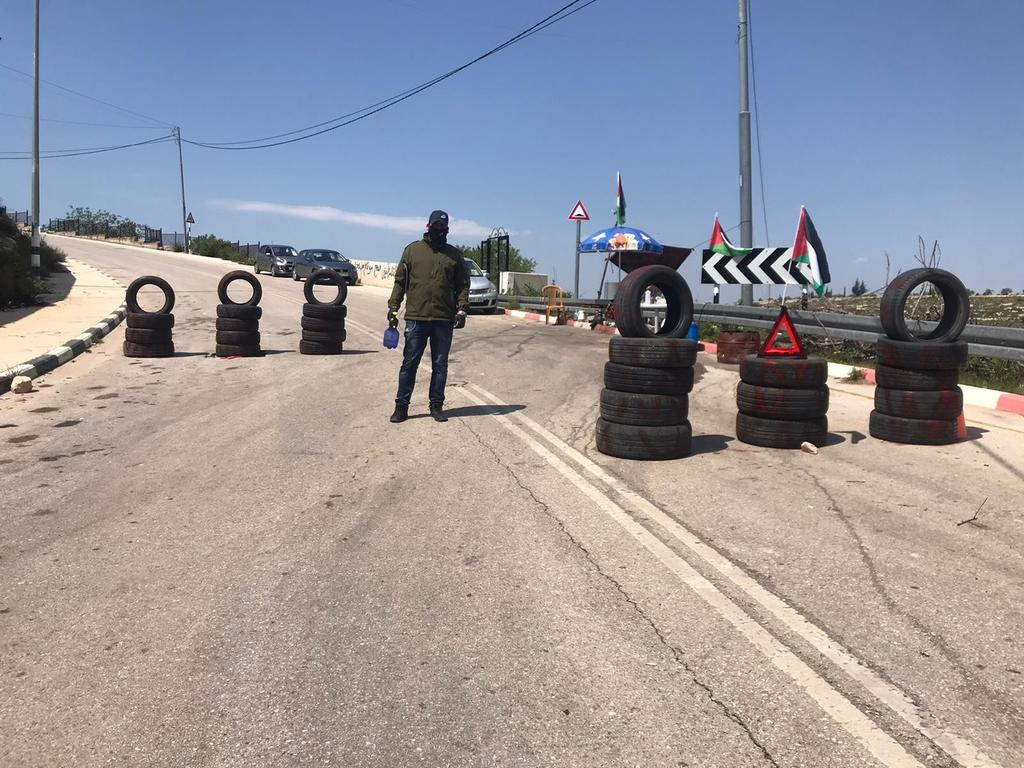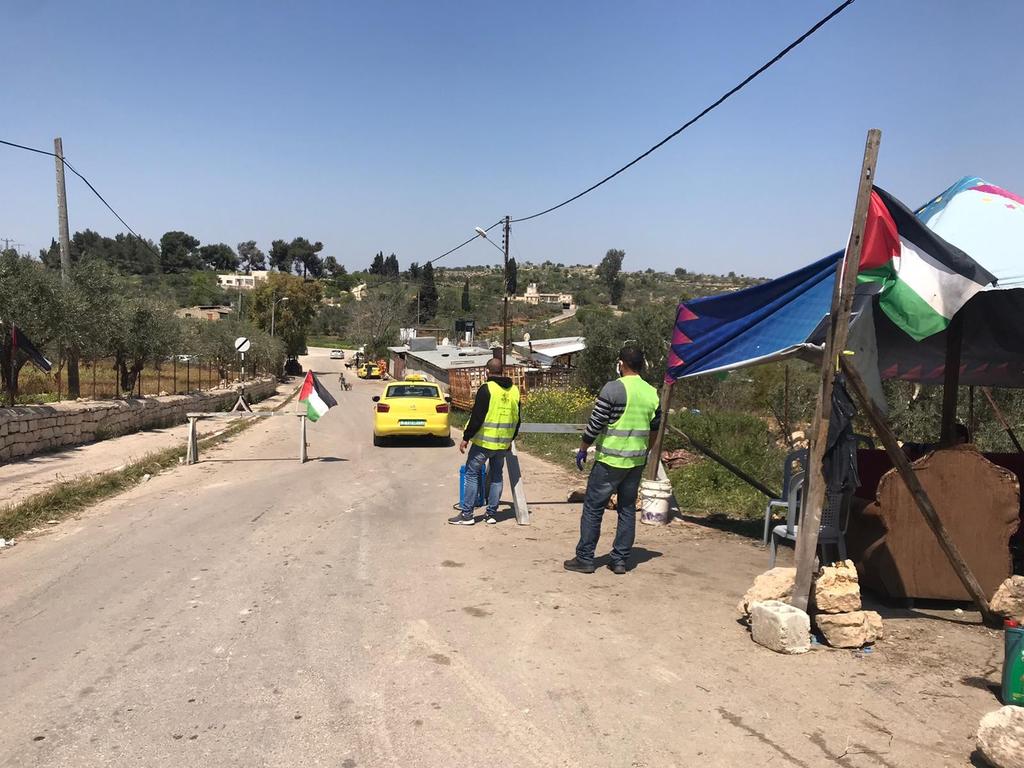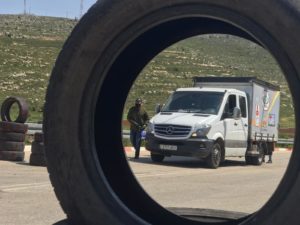On the outskirts of Ramallah, 10 miles to the northeast, sits a village tucked between the sleepy hills of the West Bank, with a population of about 6,000.
Sinjil, small in size, is huge in deeds. It has become an example to follow for Palestinians.
3 View gallery


A volunteer stands at one of the entrances to the West Bank city of Sinjil, checking and sanitizing cars amid the coronavirus pandemic
(Photo: Mohammed Ghafary)
Soon after the coronavirus outbreak began, the village's residents formed popular committees to deal with the deadly threat.
They immediately ordered the entrances to Sinjil shuttered, and restricted access to outsiders. All recreational facilities were ordered to close. Only grocery stores remain open, with limited working hours.
Mayor Dr. Moataz Tawafsha, who heads the Emergency Committee, said that five committees were formed to deal with the coronavirus.
“We have created an Emergency Committee to lead and manage this phase in light of the difficult circumstances in which Palestine and the world find themselves,” he said.
Tawafsha said they created the panels to meet the community's immediate needs. “We have several committees, including one for security that is led by a group of young volunteers, to protect the town and implement the decisions and instructions received from the Palestinian government regarding closures. It also plays a role in protecting the entrances to the town and [enforcing] the curfew.”
Another committee is the Food Security Committee, which collects products from local stores and organizes the stock for later distribution.
The Palestinian Authority declared a state of emergency on March 5, after reporting the West Bank's first coronavirus cases, and renewed the order a month later. A strict curfew was imposed. No one could leave home for work, putting a great financial burden on Sinjil and its residents.
The village immediately launched a charitable initiative on its Facebook page under the title “Think of Others,” calling on the town’s business people to contribute what they could.
“Because of the closures, our economic situation and financial resources were greatly affected. We called on those who can donate and make financial and in-kind donations so that the shortage of foodstuff will be covered, specifically in the coming period,” the mayor said.
Sinjil is a farming community but about 300 residents work in Israel, and a similar number work outside the village throughout the West Bank. PA Prime Minister Mohammad Shtayyeh has repeatedly called on Palestinians working in Israel to return home.
Two people have died in the PA because of the coronavirus: the first was a 60-year-old woman whose son worked in Israel and came into contact with her upon his return. So far, at least 308 cases of the virus have been identified in the Palestinian territories.
Sinjil’s Statistics Committee was formed in an effort to ensure that all who enter the village were screened for COVID-19, Tawafsha said. “Its role is to monitor the arrivals of returning workers and visitors coming from outside. Especially because of the news we hear about a large number of cases in Israel.”
Anis Sameh is one of those workers who answered the call of the prime minister and returned home. He said that upon arrival he was quarantined for two weeks, in a house provided to the village for that purpose by one of its residents.
“That made the decision to return easy, by ensuring a good, clean place for me and others,” Sameh said. “The young people called me all the time to check on me. They brought me food and left it at the door. If I needed something, I would contact them and they would quickly bring it.”
At the outset of the health crisis, many rumors and fake news created fear and confusion among Palestinians. That led officials in Sinjil to form a Media Committee to educate people and keep them informed of the latest news on the pandemic.
Wearing masks, volunteers from the Security Committee, man roadblocks at the entrances to their village, putting themselves between their families and potential carriers of the coronavirus.
One of those volunteers is Ziad Khalil. He said that it was his “civic duty” to help his village and its people. He said they sanitize every car that enters.
“Our role is to organize the streets. Every strange car that tries to enter Sinjil must be stopped and the driver asked where it’s going. If they are not approved for admission to the town, we ask those whom they came to see to come to the checkpoint and accept delivery there,” Khalil said.
Since the initiative began in early March, a large room at the municipality has been filled with cases of cooking oil, rice, flour and sugar.
Hussein Ghafary, head of the Food Committee, said that they consulted with the villagers on how and when to distribute the food packages.
“We have 10 main families in Sinjil, and we chose two from each family to draw up a list of those who should be helped. They know who is in need. The privacy and dignity of the needy must be respected,” Ghafary said.
3 View gallery


Volunteers check cars passing through the West Bank city of Sinjil during the coronavirus pandemic
(Photo: Mohammed Ghafary)
The coronavirus has affected almost everyone in the village, including the families of the hundreds of workers who lost their jobs, who used to give and are now on the receiving end.
“We are targeting needy families such as those of taxi drivers, day laborers and workers who left their jobs in Israel and returned home,” Ghafary noted.
"In the past, especially during the holy month of Ramadan, parcels were distributed to specific families that were poor and underprivileged. But the situation is different now, as the crisis affected all of us,” he added.
Ramadan this year is expected to begin on April 23 or 24.
So far, more than 600 food packages have been prepared for the holiday containing the basic stables as well as meat. Each package costs $70 to prepare.
Ghafary said that in addition to contributing food and money, some have offered homes to be used as quarantine sites while others paid the electric and medical bills of those struggling. Some homeowners have offered tenants to defer rent payments.
Some donors have asked that their money be allocated to supplying children with items such as milk, diapers, and toys.


